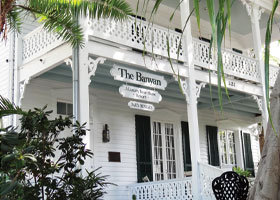From Key West, With Care

The Banyan Resort in Key West, Florida, is the first lodging establishment in the Keys to earn Green Lodging certification. In other words, the resort has been recognized by Florida’s Department of Environmental Protection for working to protect Florida’s natural resources, via communication, waste reduction, reuse and recycling, water conservation, energy efficiency, indoor air quality and transportation improvements.
Going green in Key West—an island that’s just four miles long and two miles wide—is crucial to maintaining the island’s tourism industry, which is greatly dependent upon its mild year-round climate and healthy marine ecosystem. In 2009, more than 2.2 million tourists visited Key West to walk Duval Street, peek into Ernest Hemingway’s writing quarters, stand at the southernmost point of the Continental U.S. and scuba dive to Toppino’s Reef and the Cayman Salvager shipwreck site. According to the National Oceanic and Atmospheric Administration (NOAA), more than 33,000 jobs in the Florida Keys are supported by ocean recreation and tourism, accounting for 58% of the local economy and $2.3 billion in annual sales. But environmental pressures from increasing coastal populations, ship and boat groundings, marine debris, poaching and climate change are all threatening the health of the Keys ecosystem, according to NOAA. Once abundant green sea turtles and thriving coral are now experiencing low rates of recovery.
Ecotourism in Action

Involving tourists in conservation efforts is key: whether it’s through street drains marked with the message: “No Dumping—Drains to Ocean” or hotels like the Banyan asking guests to leave a lighter environmental impact.Julie Crane, the Banyan’s general manager, explained that the environmental investments and renovations which earned them Green Lodging certification in 2007 were completed despite a dwindling economy and strict historical preservation building regulations. Today, in addition to their landmark banyan trees, the resort showcases roof-top solar panels that provide heat for the pool, courtyard decking made with recycled plastic lumber and high-efficiency compact fluorescent bulbs in over 90% of property lighting fixtures. All of the faucets, showers and toilets throughout the resort are water-saving low-flow fixtures and air conditioning units in unoccupied rooms run at an energy-conserving 78-80 degrees.
Each cottage-like unit has its own recycling bin (mine was under the kitchen sink) which together with an on-site recycling center makes it easy for guests to properly dispose of plastic shells once filled with to-go pieces of key lime pie. Rainwater, which can be plentiful during a Key West storm, is recycled from four large collection barrels that are fenced off in the back of the property.
Venturing Out
If guests want to contribute their own sustainable ethos to Key West, they can remember to pack their reusable totes. Plastic bags are not recyclable on the island, and, in fact, the Florida legislature prevents any Florida community from banning retail bags or imposing a tax or fee on plastic bags at retail stores.
Fortunately, I came upon more roosters than plastic bags when I took one of the resort-owned bicycles available for guests for a ride around the city. Cycling through the tropical landscape with the ocean breeze on my face undoubtedly beat riding inside a trolley or a bright pink Key West taxi. On the last day of my trip, when I took a ferry from Key West’s port to the ghost town of Fort Jefferson, the surrounding pristine aqua water underscored how vital it is to preserve this extraordinary place.

